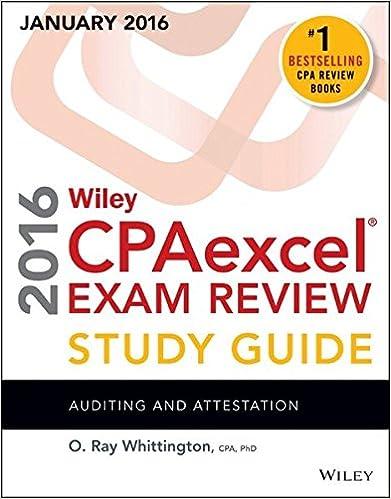Question
Hello, When attempting to access the Study Guide/Workbook to Accompany Managerial Accounting (1st edition), I need assistance. In the t-tables, h. is showing to be
Hello,
When attempting to access the Study Guide/Workbook to Accompany Managerial Accounting (1st edition), I need assistance. In the t-tables, h. is showing to be $46,700. However when I read h. at the top for given data, it reads "completed all jobs but one; the job cost sheet for this job shows $2100 for direct materials $2000 for direct labor $4100 applied overhead". Can you please help me to understand where the $46700 is coming from? Is there a formula? I am trying to complete the work in process inventory and finished goods inventory t-tables.
Thank you in advance for your assistance.
Question:
Study Guide/Workbook to accompany Managerial Accounting (1st Edition)
Chapter 2, Problem 5PSA
Problem
Recording Manufacturing Costs and Analyzing Manufacturing Overhead
Christophers Custom Cabinet Company uses a job order costing system with overhead applied as a percentage of direct labor costs. Inventory balances at the beginning of 2009 follow:
| Raw materials inventory | $15,000 |
| Work in process inventory | 5,000 |
| Finished goods inventory | 20,000 |
The following transactions occurred during January:
(a) Purchased materials on account for $26,000.
(b) Issued materials to production totaling $22,000, 90 percent of which was traced to specific jobs and the remainder treated as indirect materials.
(c) Payroll costs totaling $15,500 were recorded as follows:
$10,000 for assembly workers
3,000 for factory supervision
1,000 for administrative personnel
1,500 for sales commissions
(d) Recorded depreciation: $6,000 for machines, $1,000 for office copier.
(e) Had $2,000 in insurance expire, allocated equally between manufacturing and administrative expenses.
(f) Paid $6,500 in other factory costs in cash.
(g) Applied manufacturing overhead at a rate of 200 percent of direct labor cost.
(h) Completed all jobs but one; the job cost sheet for this job shows $2,100 for direct materials, $2,000 for direct labor, and $4,000 for applied overhead.
(i) Sold jobs costing $50,000; the company uses cost-plus pricing with a markup of 30 percent.
Required:
1.Set up T-accounts, record the beginning balances, post the January transactions, and compute the final balance for the following accounts:
Raw Materials Inventory
Work in Process Inventory
Finished Goods Inventory
Cost of Goods Sold
Manufacturing Overhead
Selling and Administrative Expenses
Sales Revenue
Other accounts (Cash, Payables, etc.)
2. Determine how much gross profit the company would report during the month of January before any adjustment is made for the overhead balance.
3. Determine the amount of overor underapplied overhead.
4. Compute adjusted gross profit assuming that any overor underapplied overhead balance is adjusted directly to Cost of Goods Sold.
Step-by-step solution
Step 1 of 1
Req. 1
| Raw Materials Inventory | Work in Process Inventory | Finished Goods Inventory | |||
| 1/1 15,000 | b. 22,000 | 1/1 5,000 | h. 46,700 | 1/1 20,000 | i. 50,000 |
| a. 26,000 |
| b. 19,800 |
| h. 46,700 |
|
| Bal. 19,000 |
| c. 10,000 |
| Bal. 16,700 |
|
|
|
| g. 20,000 |
|
|
|
|
|
| Bal. 8,100 |
|
|
|
|
Cost of Goods Sold |
Manufacturing Overhead | Selling and Administrative Expenses | |
| i. 50,000 | b. 2,200 | g. 20,000 | c. 2,500 |
|
| c. 3,000 |
| d. 1,000 |
|
| d. 6,000 |
| e. 1,000 |
|
| e. 1,000 |
| Bal. 4,500 |
|
| f. 6,500 |
|
|
|
|
| Bal. 1,300 Overapplied |
|
|
Sales Revenue | Other Accounts (Cash, Payables, etc.) | ||
|
| i. 65,000 | i. 65,000 | a. 26,000 |
|
|
|
| c. 15,500 |
|
|
|
| d. 7,000 |
|
|
|
| e. 2,000 |
|
|
|
| f. 6,500 |
|
|
| Bal. 8,000 |
|
Supporting Calculations:
b. Direct Materials $22,000 x 90% = $19,800;
Indirect Materials $22,000 x 10% = $2,200
c. Selling and administrative salaries = $1,000 + $1,500 = $2,500
g. Applied manufacturing overhead = $10,000 X 200% = $20,000
h. Ending Balance in WIP = $2,100 + $2,000 + $4,000 = $8,100
Cost of Goods Manufactured = $5,000 + $19,800 + $10,000 + $20,000 - $8,100 =
$46,700
i. Sales Revenue = $50,000 X 1.3 = $65,000
Req. 2
Unadjusted gross profit = $65,000 - $50,000 = $15,000
Req. 3
Manufacturing overhead is $1,300 overapplied.
Req. 4
Adjusted gross profit = $65,000 ($50,000 - $1,300) = $16,300
Comment
Step by Step Solution
There are 3 Steps involved in it
Step: 1

Get Instant Access to Expert-Tailored Solutions
See step-by-step solutions with expert insights and AI powered tools for academic success
Step: 2

Step: 3

Ace Your Homework with AI
Get the answers you need in no time with our AI-driven, step-by-step assistance
Get Started


